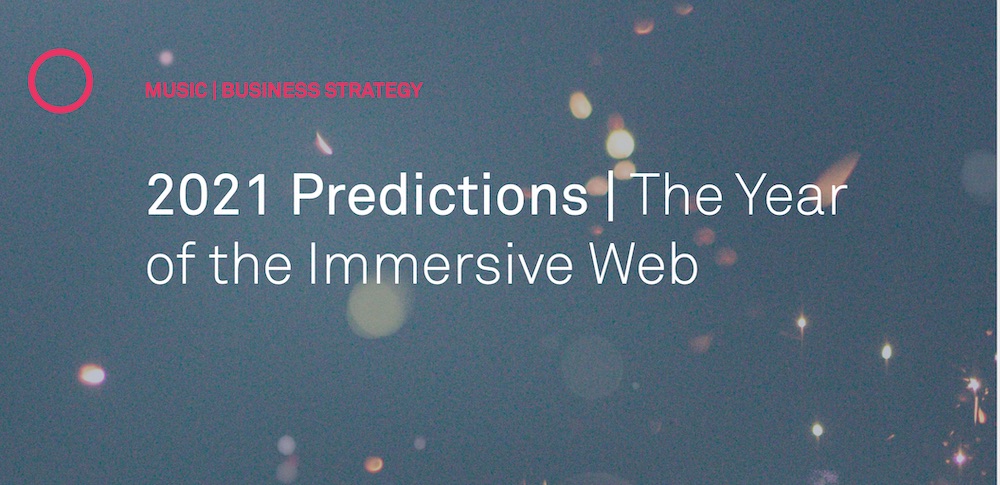2021 Predictions: The year of the immersive web


As we approach the end of 2020 it is time to look forward to what 2021 may bring. MIDiA has published the fifth edition of our Annual Predictions report which clients can read here. There are 27 predictions in the report, but I am sharing a few of them here. MIDiA has a pretty good track record with its predictions; 79% of our predictions for 2020 were correct.
These are the seven meta and cultural trends that we believe will shape 2021:
1. The immersive web
2. Recessionary impact
3. The great reaggregation
4. The return of synchronous experiences
Featured Report
India market focus A fandom and AI-forward online population
Online Indian consumers are expected to be early movers. They are high entertainment consumers, AI enthusiasts, and high spenders – especially on fandom. This report explores a population that is an early adopter, format-agnostic, mobile-first audience, with huge growth potential.
Find out more…5. Social consumption and micro communities
6. Video streaming as a cultural catalyst
7. The end of influencers
The immersive web
Web 1.0 was an information dump; web 2.0 added multimedia and social. Now we are entering the third phase, which MIDiA terms the immersive web. As is usually the case with big epoch shifts, this will not be a clear and sudden change but instead a steady change – a change that is, in fact, already happening. The immersive web is characterised by environments in which we do not simply conduct extensions of IRL activity (e-commerce, video calls) but ones that create behaviours and relationships that only, and can only, exist within these environments. Apps and platforms like Roblox, TikTok and Discord are early iterations of the immersive web, but merely hint at what will come. The trend will be driven by Gen Z, who have grown up with social apps from the playground onwards. Gen Z relies more than any previous generation on such apps for social interaction and expression, forming muscle memory for digital-first relationships. The COVID-19 lockdown measures have accentuated this shift, further solidifying Gen Z’s receptivity to future immersive web experiences.
Music
Here is a short version of some of the trends we expect to shape music in 2021:
- The start of an artist economy: Streaming is a song economy of which the scale benefits rights holders far more than creators. The industry needs to work towards a collection of models that work for artists. Components could be micro-communities (see below), sounds platforms, ticketed live streams, skills marketplaces, and virtual merch.
- The rise of micro-communities: Niche is the new mainstream. The next phase of this market dynamic is the emergence of micro-communities; small audiences of dedicated fans who almost consider it an honour-bound duty to support their artists.
- The creator tools revolution: Creator tools, particularly music production and collaboration, will be one of the most important market shifts in 2021. Companies like Splice, LANDR and Output will continue to build scale in 2021, changing both the culture and business of music.
- Live streaming professionalises: With live unlikely to be anything close to full capacity until the latter part of 2021, live streaming will be used by a growing body of artists as a genuine revenue driver, rather than the audience engagement role it played in much of 2020, driven by increased professionalisation, better distribution and more sophisticated monetisation.
- Music continues to deliver as an asset class: Although the pandemic dented music publishing’s long-term growth story, music catalogues retain strong appeal as an asset class, not least because they are performing better in relation to many asset classes that have been hit hard by the pandemic and that look vulnerable to the coming recession. The imbalance between supply and demand remains, so expect prices paid to continue to accelerate.
- UGC continues to accelerate: User-generated content (UGC) music revenues reached $4 billion in 2020 and will push up to $4.9 billion in 2021. The crucial difference between UGC music now compared to five years ago, is that the focus is on genuine user creativity rather than users simply uploading others’ music.
2020 was a year like no other in modern times, with the impact on digital entertainment both pronounced and creating the foundations for accelerated innovation in 2021. Whatever may happen to the global economic and health outlook, digital entertainment will go through further dramatic change in 2021.

The discussion around this post has not yet got started, be the first to add an opinion.